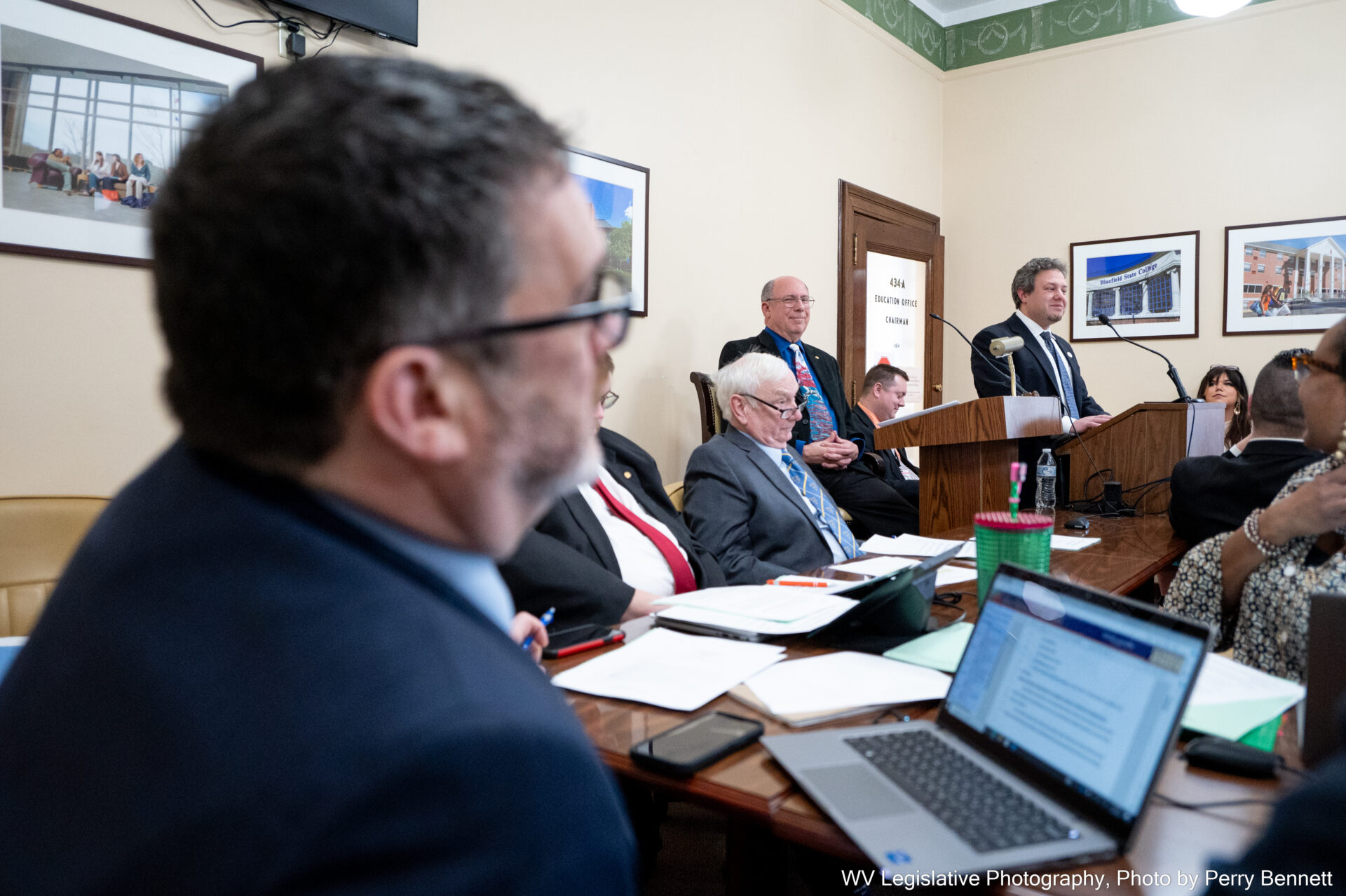The House Committee on Education spent the better part of a two hour meeting Wednesday discussing two bills. One would restrict bathroom use in schools based on sex, and another would help arm teachers.
Bills restricting the use of school facilities by transgender students – namely bathrooms and locker rooms – have gained popularity across the country in recent years.
House Bill 4806 as described in the meeting “would prohibit public school students the use of multiple occupancy restrooms or changing areas within schools for the gender that the students were not assigned at birth.”
Minority chair Del. Mike Pushkin, D-Kanawha, pointed out early in discussion of the bill that the 4th Circuit Court of Appeals, which includes West Virginia, had recently ruled against a similar bill in Virginia.
Pushkin invited Interim Executive Director for the American Civil Liberties Union of West Virginia Eli Baumwell to discuss the court ruling’s impact. Puskin asked Baumwell if ACLU-WV would challenge the bill in court if it passed.
“Well, it wouldn’t be proper for me to speculate on potential litigation,” Baumwell said. “What I will say is based on controlling law here in West Virginia, I think there’s an extremely high likelihood that any challenge would cause the law to be both enjoined and eventually overturned, again, based on recent controlling precedent.”
Pushkin clarified that there was no reason to believe HB 4806 would have a different result in the courts and said a legal challenge would cost the state money. He went on to question the bill’s sponsor, Del. Dave Foggin, R-Wood, about the necessity of the bill.
“Have you received complaints from children in your district or parents in your district, regarding incidents where students felt uncomfortable in the bathroom?” Pushkin asked.
“I didn’t receive complaints, because I’m just a school teacher, but our administrators, where I teach, received several complaints,” Foggins said.
Much of the discussion time was taken up by an amendment from Minority Vice Chair Ric Griffith, D-Wayne, to create an exception for students over the age of 18 who had transitioned and updated their birth certificate.
Pushkin continued his opposition to the bill up to the final vote, calling it a solution in search of a problem. He warned the bill had the potential to harm children.
“Actually, West Virginia has a fairly high percentage of children who identify as transgender, and this will harm them,” Pushkin said. “They’re the ones who are more likely to get bullied in a public restroom. So you might think you’re doing something to protect kids, but I’m not hearing anything from kids.”
The committee voted to recommend the bill to the House, with a referral to the committee on Judiciary.
Arming Educators
Also discussed Wednesday was the possibility of allowing teachers and administrators to carry concealed firearms in school.
House Bill 4299 would designate armed staff as school protection officers or SPO’s but only with a valid West Virginia concealed carry permit and after completing the training requirements for the Prevention Resource Officer Program.
Several teachers on the committee spoke strongly in favor of the bill, including Del. David Elliott Pritt, R-Fayette. He recounted the difficulty of going through active shooter drills with the only defense for him and his students being a door and chairs.
“We live in a time where evil people walk around trying to do evil things,” Pritt said. “I’ll be damned if I’m going to sit in my classroom, and the only thing between me and someone that wants to kill me or my students is a door. So I’m going to vote for it. I urge you to vote for it as well.”
Opponents to the bill cited law enforcement opposition to such measures, given the potential confusion between an active shooter and an armed staff member. Del. Anitra Hamilton, D-Monongalia, expressed concern about bringing firearms into classrooms that have proven in recent years to be unruly and contentious.
“I just don’t feel that teachers or SPOs, whoever is training periodically, even with a yearly evaluation, or yearly training, when you are under stress, and under duress, you act differently and you cannot predict that,” she said.
Hamilton instead pointed to measures already being taken to enhance and improve school building security across the state.
Committee vice-chair Del. Joe Statler, R-Monongalia, said the bill is permissive, meaning it is ultimately up to each county and school board to allow school staff to conceal carry.
The committee recommended House Bill 4299 to the full chamber, also with a reference to Judiciary.
Also Discussed
The committee also discussed and moved forward five other bills:
- H. B. 4263, Modifying the definitions and pay grades of certain school cafeteria personnel.
- H. B. 4331, To allow money paid to state employees to go to their estate if they pass away before their retirement date.
- H. B. 4830, To address the professional development of teachers.
- H. B. 4832, Relating to state superintendent’s reports regarding the finances of school districts.
- H. B. 4838, Require county boards of education to provide long-term substitute teachers, upon hiring, with certain information.
